Breaking the reader’s heart
Author Carol Brisebois talks parenting, a mother’s love and her first novel
It’s safe to say that Carol Brisebois knows children.
A mother of three, Brisebois has built her career as an early childhood educator and currently works at the University of Winnipeg Students’ Association’s daycare. It’s a career that has allowed her see the best and worst of children, and the best and worst challenges life has to offer them.
In November, Brisebois published her first book, her sparrow, a heartbreaking tale of a mother’s persistent search for her son.
The story follows Elizabeth and her 12-year-old son Nate, who, after being kicked out of school, is manipulated into a life of drugs and crime, first by his friend’s mother and then by a drug-dealing pedophile named Blue.
Q. Her sparrow is your first book and deals with subjects like drugs, ADHD, manipulation and betrayal, that all wrap up together to form the plot. What made you choose to work with these themes? Did you find it ambitious?
A. I think that was the first story that I had to tell. I drew the character Nate from somebody who’s close to my heart and who has taught me some life lessons that no one else could have and in some of the craziest ways. I think in this particular story, all the themes were connected to each other, so I didn’t find it ambitious, more of a case of reality.
Q. You’ve said in a previous interview that you wanted to break the reader’s heart at the end of your book. Why is that?
A. Finality sends the strongest message and I really wanted people to remember the message of the story. All children belong and every child needs to be valued. We can’t overlook the worthiness of children that we might perceive to be different.
Q. What did you learn while writing the book?
A. I think my story was inside of me all along, so I already knew that, but I learned how to put it together in a way that people might be interested in reading about. It was about a six-month process, but I let it sit for a long time before I decided to go ahead to publish it. I let it sit for about two years. I began thinking I would do this as practice and I showed the manuscript to some people and they were excited about it, so with time I decided that maybe I should put it in print.
Q. You work in early childhood education. How did you incorporate what you see in your work everyday in your job?
A. There’s always one or two or more children in our care who need extra special attention and who cause a big commotion and take up a lot of energy. But I think those children are worth the effort. They have personality that becomes a very useful quality later on. Children are often exaggerated versions of adults. They cry a lot, they whine a lot, they’re dramatic.
“ Children are often exaggerated versions of adults. They cry a lot, they whine a lot, they’re dramatic
Q. You’re a mother of three. What’s the biggest lesson you’ve learned during parenting, and what’s the one thing you still struggle with?
A. When you’re a mother, you have this door opened, which sheds light on every idea you ever before believed to be true, and you have to see it in a new way. I still struggle with letting go and saying goodbye. If you’ve been with someone for that amount of time, it’s really hard to say goodbye. It’s what you want, it’s your goal, but it’s been your life for so long it’s hard to make that adjustment.
Q. What do you think is the biggest challenge parents face these days compared to when you were a child or when you were raising your first child?
A. I think life is a lot more complicated. When I was growing up, things were fairly black and white, and there was a neighbourhood and a community. People in the neighbourhood were your aunts and uncles and they made sure you did what you were supposed to do. Now families are more alienated, they’re so busy in their own little worlds.
Q. Coming back to the plot of your novel, what is different about a mother’s love as compared to a father’s love for their son?
A. That’s a question that can’t be answered generally, especially not nowadays. I think the gap between a mother’s love and a father’s love in many circumstances is narrowing. It’s becoming similar. But I think the mother carries the child before they’re born, she knows the child before they’re born. But it doesn’t mean that someone who doesn’t give birth to a child can’t be a mother and be just as attached.
To learn more about Brisebois and her sparrow, visit www.tinyurl.com/Uniter-Brisebois.
Published in Volume 65, Number 16 of The Uniter (January 20, 2011)







